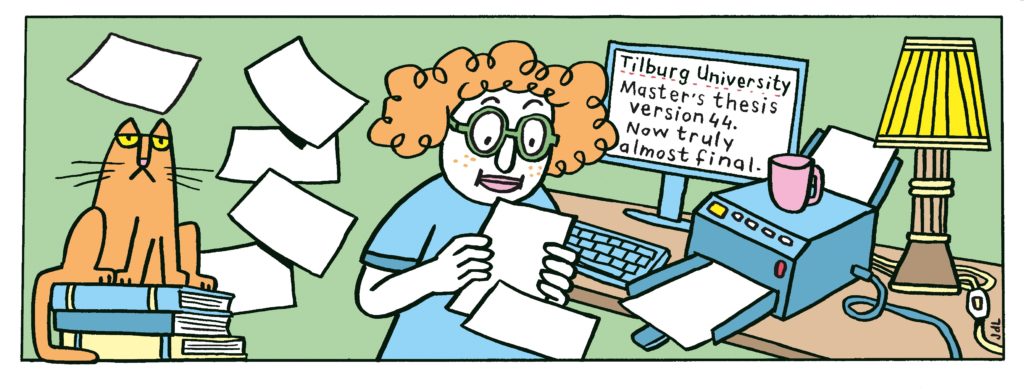The power of the protest vote: how the BoerBurgerBeweging won the Provincial Council elections
Gaining votes in the countryside as well as in the city. Less than a year ago, the BoerBurgerBeweging was the big winner of the Provincial Council elections. Sociology student Boris Schussler wanted to know why the rural party also triumphed in the city. In his Master’s thesis, he conducted research into the voting motives of BBB voters.

Where did the inspiration for your Master’s thesis come from?
‘I knew right away that I wanted to write my graduate thesis on politics. I’m involved in Dutch politics a lot. For example, every week, I listen to the podcast De Stemming (in Dutch) by political journalists Joost Vullings and Xander van der Wulp.
‘It is a family thing. At the kitchen table, we used to talk a lot of about politics. For example, if there were elections, I was encouraged to go and vote and think carefully about which party or politician would get my vote. I also talk a lot about politics with my friends.
‘Initially, I wanted to write about populism for my thesis research and wanted to investigate why politicians like Geert Wilders of the PVV are so popular among voters. But at the time my thesis project started, a political landslide took place. In the provincial elections on March 15, 2023, BBB emerged as the big winner. That’s when I changed the subject and decided to find out why the BBB was so popular at that time.’
What exactly did you research?
‘In the run-up to the elections, the BBB profiled itself as a farmers’ party that stands up for the interests of the rural population. According to party leader Caroline van der Plas, the interests of the rural population—unlike the interests of people from the Randstad—are not represented.
‘With this information in mind, it makes sense that people from rural areas voted for the BBB. However, the party also received the most votes in the cities. I was curious about the difference between rural and urban BBB voters. After all, one would expect a difference in their motives for voting.’

What is the outcome of your research?
‘Although I expected there to be a difference in the motives for voting, it turned out not to be the case. A year ago, nitrogen was a heated topic. En masse farmers blocked highways and went to The Hague. They disagreed with the measures announced to reduce nitrogen emissions and felt abandoned by the government. Caroline van der Plas also criticized the nitrogen policy. She was often in the news and regularly joined talk shows.
‘This led to many people talking about Caroline van der Plas and the BBB: at the soccer club, at the bakery, and at the kitchen table. She stood out because of her ‘normal’ appearance, a citizen who shook up politics in The Hague. The BBB voters I spoke to for my research indicated that their vote for the BoerBurgerBeweging was primarily a ‘protest vote’.
‘Some were angry about the nitrogen policy, others because of the childcare allowance failings, and yet others because of the gas crisis in Groningen. In the eyes of voters, these crises have one thing in common: they were all caused by the Rutte administration. The fact that Mark Rutte did not take responsibility for any of the crises did not go down well with voters. For both people in the countryside and people in the city, Caroline van der Plas was, at that time, a breath of fresh air and a dissent voice.’
However, these voters do not appear to be truly loyal. In the recent House of Representatives elections, it was not the BBB, but the PVV that was the largest party. How could you explain that?
‘I didn’t have enough time to include the last House of Representatives elections in my research. So I can’t say for sure, but I do have an inkling of why voters switched to the PVV in large numbers. First of all, several party leaders announced their departure before the elections. Think, for example, of Mark Rutte of the VVD, Sigrid Kaag of D66, and Wopke Hoekstra of the CDA. Among all these new faces, Geert Wilders was a familiar and trusted face to many voters.
‘In addition, it was frequently said in the media that Wilders was ‘moderate’. Possibly, this gave voters the feeling that they were now justified in voting for him. Finally, in the run-up to the elections, there was a lot of attention on the asylum crisis, a topic that the PVV in particular has gravitated toward in recent years.
‘In the time of the pillarization (1880–1960, ed.), you really belonged to a certain club of people with whom you went to church, the soccer club, or the pub, for example. That club more or less determined who you voted for, and you remained loyal to that party. Nowadays this is different, and voters easily switch parties. As a result, parties can easily win or lose votes. It all depends on what voters are concerned about at that moment, or what issues are emphasized in the run-up to the elections.’
Master’s thesis
A literature review, experimenting in the lab or getting into the swing of things with SPSS? Tilburg University students write the most diverse theses. In the Master’s thesis section, Univers highlights one every month.
Author: Boris Schussler
Title: A matter of regional resentment in the Netherlands? A qualitative urban-rural comparison of BBB voting during the 2023 Dutch Provincial elections
Supervisor: Bram Peper
Grade: 8
Master: Sociology: Politics, Policy and Society in Comparative Perspective
Translated by Language Center, Riet Bettonviel






